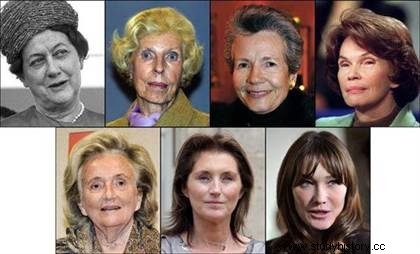 Since the Fifth Republic, the President has been the central figure in French political life. But what about the First Lady of France ? This is the title usually worn by the wife of the happy resident of the Elysée Palace. However, these ladies have no official title or status. Before the Fifth Republic, they were practically erased. But since they play a role in public, they are present at official dinners at the Elysée Palace, often during diplomatic trips abroad. While some have remained in the background and withdrawn, others have asserted themselves through political or humanitarian commitments, like their American counterparts.
Since the Fifth Republic, the President has been the central figure in French political life. But what about the First Lady of France ? This is the title usually worn by the wife of the happy resident of the Elysée Palace. However, these ladies have no official title or status. Before the Fifth Republic, they were practically erased. But since they play a role in public, they are present at official dinners at the Elysée Palace, often during diplomatic trips abroad. While some have remained in the background and withdrawn, others have asserted themselves through political or humanitarian commitments, like their American counterparts.
The first First Lady of France
Yvonne De Gaulle (1959 to 1969)
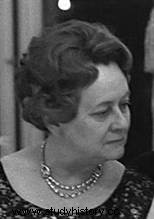 This lady who was nicknamed "Aunt Yvonne", born in 1900, comes from a family of industrialist from Calais, a city where his brother was mayor. After studying with the Dominicans in Asnières, she married Charles de Gaulle in April 1921. In 1934, they settled in the “La Brasserie” property, renamed “La Boisserie” in Colombey-les-Deux-Eglises. She and her three children follow the president during the war. In 1948, she created the Anne de Gaulle Foundation in Milon la Chapelle in memory of her daughter, who was born disabled.
This lady who was nicknamed "Aunt Yvonne", born in 1900, comes from a family of industrialist from Calais, a city where his brother was mayor. After studying with the Dominicans in Asnières, she married Charles de Gaulle in April 1921. In 1934, they settled in the “La Brasserie” property, renamed “La Boisserie” in Colombey-les-Deux-Eglises. She and her three children follow the president during the war. In 1948, she created the Anne de Gaulle Foundation in Milon la Chapelle in memory of her daughter, who was born disabled.
Catholic, low-key, she led a simple life during her husband's presidency, influencing him in matters of morals and ensuring that people kept away from the government of people who are divorced or guilty of adultery.
In 1962, the couple was the target of the attempted attack on Petit Clamart. For having threatened the life of a woman, the instigator of this assassination attempt was shot. When the General resigned in 1969, they retired to La Boisserie. Widowed in 1970, she lived there until 1978, then entered the retirement home of the Sisters of the Immaculate Conception in Paris. She died in Val de Grâce in November 1979.
Claude Pompidou (1969 to 1974)
 Born in 1912, from the Breton bourgeoisie, she studied law in Paris, then married Georges who is in education, in October 1935 and adopts a son Alain Pompidou.
Born in 1912, from the Breton bourgeoisie, she studied law in Paris, then married Georges who is in education, in October 1935 and adopts a son Alain Pompidou.
Appreciating poetry and contemporary art, she collected works by artists of her time, including Yves Klein. Honorary president of the Contemporary Art Center of Cajarc in the Lot, and owning a house in the region, the couple received their friends there, including Françoise Sagan, Pierre Soulages, Bernard and Annabelle Buffet.
At the Elysée, Claude nicknamed Bibiche, introduced a more modern style, which is not really the custom... She is practically the only First Lady who does not "will never happen" to the atmosphere of the palace!
The Claude Pompidou Foundation, of which she was president for more than thirty years, aims to help the elderly, hospitalized patients and disabled children. Claude built and managed fifteen establishments for the elderly and disabled, as well as a home for sick children. On her death in July 2007, Bernadette Chirac will become the new president of the Claude Pompidou Foundation in September.
Anne Aymone Giscard d'Estaing (1974 to 1981)
 Descendant of the Sauvage de Brantes and the princes of Faucigny-Lucinge, she studied at the Ecole du Louvre and became Madame Valéry Giscard d'Estaing in December 1952, they had four children. Very active in her husband's presidential campaign, she also runs a women's investment club.
Descendant of the Sauvage de Brantes and the princes of Faucigny-Lucinge, she studied at the Ecole du Louvre and became Madame Valéry Giscard d'Estaing in December 1952, they had four children. Very active in her husband's presidential campaign, she also runs a women's investment club.
Nicknamed Madame DQ "Dignity-Quality" by the Canard Enchainé, she represented Valéry at events such as the celebrations of Joan of Arc in Orléans in 1975, the centenary of the French Institute of Oriental Archeology in Cairo in 1980 and accompanied her husband for the vows to the French on December 31, 1975. She had an office at the Elysée and regularly received women members of the government to discuss social issues.
Among her other duties, she was municipal councilor for Chanonat in the Puy de Dôme between 1983 and 1995 and organizes a charity evening each year at the Château de Versailles, for the benefit of the Children's Foundation, which she created in 1977.
More political First Ladies
Danielle Mitterrand (1981 to 1995)
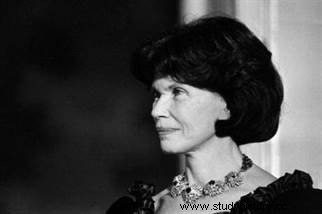 Born in 1924 in Verdun, from parents who were militant teachers of the SFIO (her father was dismissed by the government of Vichy) settled in Cluny, she passed her baccalaureate in Annecy in 1941. Her parents housed the maquisards, her sister serving as a "mailbox" in the Resistance for the national movement of prisoners of war, Danielle joined the Resistance as liaison officer and was introduced to her future husband:François "Morland" Mitterrand, whom she married in October 1944, they would have three sons.
Born in 1924 in Verdun, from parents who were militant teachers of the SFIO (her father was dismissed by the government of Vichy) settled in Cluny, she passed her baccalaureate in Annecy in 1941. Her parents housed the maquisards, her sister serving as a "mailbox" in the Resistance for the national movement of prisoners of war, Danielle joined the Resistance as liaison officer and was introduced to her future husband:François "Morland" Mitterrand, whom she married in October 1944, they would have three sons.
During the presidency of her husband, a woman of action, she engaged in a policy for the third world (Fidel Castro, Salvadoran guerrillas) which often put her husband in delicate political situations.
In 1986, she created the Fondation France Libertés, a humanitarian organization, intended to respond to distress calls from oppressed women and men. She will support the Tibetan people, will fight against apartheid in South Africa, will take a stand for the Kurds and the Indian peoples of Latin America, will be one of the first to realize the scourge of AIDS in Africa. She is very interested in education and advocates for the notion of wealth but not money-wealth. Provocative, she openly criticized the policies of Jacques Chirac and even opposed part of his family by officially taking a NO position in the European referendum in 2005.
Bernadette Chirac (1995 to 2007)
Born in Paris in May 1933, from a noble family originally from the Trois Evêchés (Toul, Metz, Verdun), industrial owners (porcelain and enamel manufacturer), she is related to the Chodron de Courcel, a very practicing Catholic family.
Her father mobilized in 1939, then taken prisoner, she fled with her mother to the grandmother, countess at the Château de Coudène in Lot et Garonne. Finishing her schooling in Paris, she had Sylvie Joly (future actress) as a classmate, then entered Sciences Po in 1950 where she met her future husband. Married in March 1956, despite the reluctance of his family, Jacques being from a different background, they will have two daughters, including Claude, his father's communications advisor, married to Thierry Rey, judoka, then a little Vietnamese since 1979, but without adoption . From 1972, she embarked on a bachelor's degree and then a master's degree in archeology and worked on excavation sites in Vaison La Romaine.
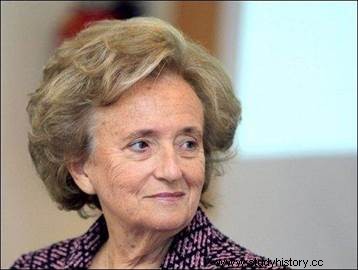 Her political career began in 1971 as municipal councilor of a small town Sarran in Corrèze, then general councilor of the Corrèze from 1979 to 2004. She will advance developments in her region:LGV Poitiers-Limoges and will intervene in the new judicial map against the abolition of the TGI of Tulle.
Her political career began in 1971 as municipal councilor of a small town Sarran in Corrèze, then general councilor of the Corrèze from 1979 to 2004. She will advance developments in her region:LGV Poitiers-Limoges and will intervene in the new judicial map against the abolition of the TGI of Tulle.
Following the health problems of her eldest daughter Laurence, Bernadette embarked in 1973 on improving hospital conditions for children and adolescents.
In 1990, she founded the Association du Pont Neuf to promote exchanges between young people from eastern countries and France and will be the president of the International Festival of Dance. In 1994, taking over the presidency of the Fondation des Hôpitaux de Paris – Hôpitaux de France, she took over the Yellow Pieces operation with the essential “Yellow TGV pieces”. A member of the International Center for Missing and Sexually Exploited Children, she also took over from Claude Pompidou in September 2007 at the head of the Foundation bearing her name.
She gave her opinion when the National Assembly was dissolved in 1997, became one of her husband's assets for the 2002 campaign, was one of the centerpieces of the future UMP, alongside JP Raffarin and militates for the reconciliation of the “Chiraquiens” and the “Sarkozists”. She will say of Nicolas Sarkozy:"he is fantastic, was trained at the school of Jacques Chirac, he is an excellent speaker, he has great charisma" and will go to the front for his future re-election.
Characterized by her "old-France" allure with her eternal handbag, she is one of the rare First Ladies not to complain about the constraints and the the social rhythm of the Elysée Palace; Bernadette Chirac was made Chevalier of the Legion of Honor in March 2009 and Dame of the Order of Malta!
First ladies put to the test of modernity
Cecilia Sarkozy (2007)
Born in November 1957 in Boulogne Billancourt, her status as First Lady will be particularly short:six months.
Of Moldavian origin by her father and Spanish by her mother, she started studying law in Paris, did odd jobs and became assistant to the senator of Indre. She will marry Jacques Martin in August 1984 at the town hall of Neuilly, Nicolas Sarkozy being mayor on this date. Remarried to Nicolas Sarkozy in October 1996, they will have a little Louis in 1997.
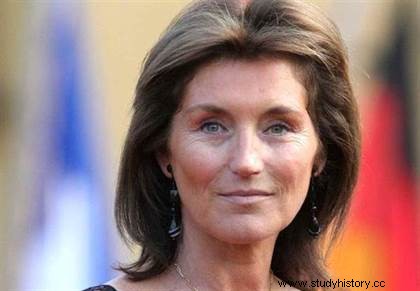 In May 2005, she confided to Télé Star:"I don't see myself as a first lady, it shaves me . I am not politically correct. I walk around in jeans, fatigues or cowboy boots. I don't fit the mold." From then on, she no longer appeared alongside her husband, but became a well-known media personality, as a member of her husband's ministerial cabinets, and would regularly make the headlines.
In May 2005, she confided to Télé Star:"I don't see myself as a first lady, it shaves me . I am not politically correct. I walk around in jeans, fatigues or cowboy boots. I don't fit the mold." From then on, she no longer appeared alongside her husband, but became a well-known media personality, as a member of her husband's ministerial cabinets, and would regularly make the headlines.
She had a chief of staff and a press secretary, and would have introduced various political figures to her husband. She took part in the negotiations for the release of Bulgarian doctors and nurses in Tripoli, and was promoted to honorary citizen of Sofia.
Carla Bruni Sarkozy (2007 to 2012)
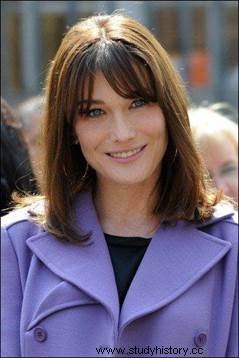 Born in 1967 in Turin, of musical parents (her biological father being a businessman living in Brazil) , the family moved to France around 1974 following kidnappings by the Italian Red Brigades. She learned the piano then the guitar, studied in private boarding schools in France and Switzerland, then studied architecture in Paris, she became a model, then a top model in 1988, did cinema in 1995, then launched into music.
Born in 1967 in Turin, of musical parents (her biological father being a businessman living in Brazil) , the family moved to France around 1974 following kidnappings by the Italian Red Brigades. She learned the piano then the guitar, studied in private boarding schools in France and Switzerland, then studied architecture in Paris, she became a model, then a top model in 1988, did cinema in 1995, then launched into music.
In 2006, she will carry the Italian flag to raise the colors at the opening ceremony of the Olympic Winter Games in Turin. She will have a son in 2001 and will meet Nicolas Sarkozy in November 2007, whom she will marry in February 2008.
She has an office at the Elysée, in the "Madame's wing", in the extension of the private apartments and has her private secretary. She accompanies the President on his State visits, notably to the United Kingdom, she represented the President during the visit of the Dalai Lama to France.
She is involved in the charitable field, more particularly in the fight against AIDS and becomes the world ambassador for the fight against AIDS, tuberculosis and malaria. She also took part in the fight against the wearing of furs. Participating in the liberation of women in countries at war, she was elected in the first third of the "most powerful women in the world".
Valerie Trierweiler (2012-2014)
Born Massonneau in February 1965, Valérie Trierweiler comes from a modest Anjou family. After literary and university studies, she began a journalistic career, mainly for the magazine Paris-Match. There she met Denis Trierweiler, whom she married in 1995. Thereafter, she hosted or participated in several political television programs.
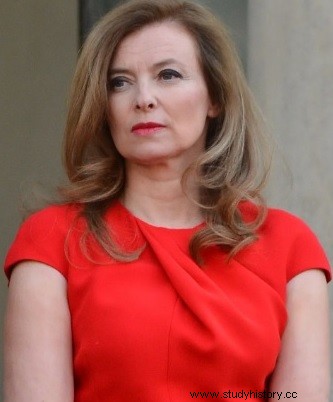 In the mid-2000s, she began an affair with François Hollande, then first secretary of the socialist party. She divorced in 2007 while keeping the name of her ex-husband. When her new companion becomes a candidate for the presidency of the Republic, she actively participates in his campaign. After François Hollande's victory, the question of his status arises. Indeed, she has not remarried, refuses the title of "First Lady of France" and intends to continue her professional activities.
In the mid-2000s, she began an affair with François Hollande, then first secretary of the socialist party. She divorced in 2007 while keeping the name of her ex-husband. When her new companion becomes a candidate for the presidency of the Republic, she actively participates in his campaign. After François Hollande's victory, the question of his status arises. Indeed, she has not remarried, refuses the title of "First Lady of France" and intends to continue her professional activities.
She nevertheless moved to the Elysée, where she had a small office of collaborators and a driver. She accompanies the president on the first official trip to the United States, where the American media give her the title of "first girlfriend" because of her marital status.
In between rounds of the 2012 legislative campaign, she openly supports the opponent of Ségolène Royale, ex-girlfriend of François Hollande, with a tweet that has become famous. The case causes a stir within the Socialist Party and tensions in the President's family. Having ended up taking on the role of First Lady, Valérie Trierweiler, she does not hesitate to take political positions, especially during the “Leonarda affair”.
His relationship with François Hollande ended in January 2014 after the press revealed an affair between the President and an actress. After leaving the Elysée, Valérie Trierweiler resumes her journalistic activities and engages in several charities. In September 2014, the publication of his autobiographical book Thank you for this moment will make a big noise.
Brigitte Macron (2017- ...)
The arrival of Brigitte Macron at the Elysée in 2017, in the wake of newly elected President Emmanuel Macron, marks the return of a more conventional and consensual style of "Première lady”.
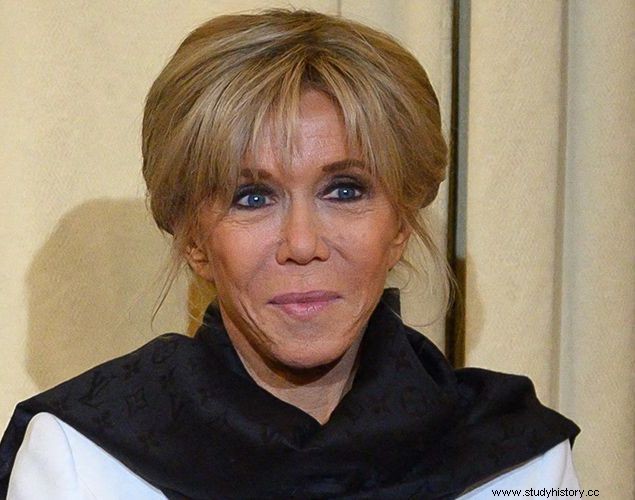 Born Trogneux in April 1953, Brigitte Macron comes from a rather bourgeois family in Amiens. In 1974, she married André-Louis Auzière, with whom she had three children. After passing the Modern Letters Capes, she teaches French and Latin in a private high school. There she meets a high school, Emmanuel Macron, with whom she begins a romantic relationship. The age difference between the two lovers will cause scandal.
Born Trogneux in April 1953, Brigitte Macron comes from a rather bourgeois family in Amiens. In 1974, she married André-Louis Auzière, with whom she had three children. After passing the Modern Letters Capes, she teaches French and Latin in a private high school. There she meets a high school, Emmanuel Macron, with whom she begins a romantic relationship. The age difference between the two lovers will cause scandal.
After her divorce, she married E. Macron in 2007. When her husband entered politics in 2012, their couple quickly attracted media attention. The couple regularly make the "one" of the media, displaying themselves in a form of marital normality. Five years later, Brigitte Macron occupies a prominent place in the presidential campaign of her husband.
After Emmanuel Macron's victory in May 2017, she entered the Elysée, where she had the Madame wing, occupied by the "First Ladies" since Cécilia Sarkozy . The presidential couple wants the establishment of a status of "First Lady" on the American model. Instead, a transparency charter specifies the functions of the president's spouse, particularly on the international scene.
Happy ambassador of French haute couture, Brigitte Macron followed in the footsteps of Bernadette Chirac, and became president of the Fondation des Hôpitaux in 2019, and participated in the decoration of the Elysee Palace. She speaks publicly from time to time on social issues, particularly against exclusion (disability, education and illness) and violence against women.
All these First Ladies of France, so different from each other, have each played the role of fashion ambassador and have become known for their humanitarian, responsible or president of a foundation.
Bibliography
- The First Ladies of the Fifth Republic – Philippe Valode. the archipelago, 2010.
- First Ladies, by Robert Schneider. Perrin, 2018.
